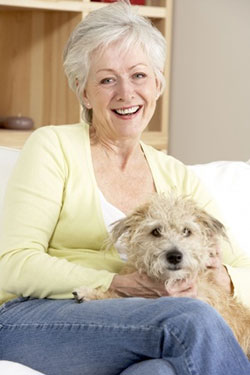 For some seniors, especially those who live independently, retirement living can seem somewhat lonely. In addition to recommending that older persons get out and try new activities, many senior living experts feel that adopting a cat or dog is a viable way for a person to reduce feelings of loneliness and develop the positive feelings associated with companionship.
For some seniors, especially those who live independently, retirement living can seem somewhat lonely. In addition to recommending that older persons get out and try new activities, many senior living experts feel that adopting a cat or dog is a viable way for a person to reduce feelings of loneliness and develop the positive feelings associated with companionship.
Man’s Best Friend
Dog ownership has long been associated with increased longevity, better overall mood and improved cardiovascular health.
One New York Times blogger, Jane Brody, reported on her experience as a 4-year widow and nonagenarian who this year adopted a small Havanese puppy named Max. According to Brody, in addition to noticing that she laughs more and feels generally less lonely at home, a surprising benefit has been the number of people she has met while walking Max.
People initiate conversations with her, ask to pet the dog and she has been able to foster new acquaintances through this.
Brody chose a Havanese puppy because it is a small, hypoallergenic breed that she can easily lift and carry— intelligent and delightfully mischievous, but easy for her to handle. It is a perfect breed for persons living in retirement apartments.
There are several other small breeds that adjust well to apartment living and that many retired persons enjoy adopting.
- Dachshunds, or "wiener dogs," are small, long pups that were initially bred in Germany to flush badgers out of burrows for fur trappers. They are intelligent, friendly and their elongated body shape and long ears give them a silly, floppy manner of moving about that is sure to keep an owner smiling. The long-haired dachshund is a particularly beautiful example of the breed, but owners with allergy concerns may prefer a short-haired variety.
- Miniature Schnauzers are another German breed. They are loyal, obedient and have wonderful guarding instincts, but lack the high-strung temperament of a Cocker Spaniel or other small breed — they will bark incessantly at an intruder, but are less inclined to bite an unknown visitor.
- Collies are a moderately-sized dog breed known for their spunk and their incredible loyalty. Originally bred to assist shepherds in herding, they are hard workers and among the most intelligent breeds. One of the smallest collie types is the Shetland, or Sheltie— they are high-energy dogs and can get a bit nervous when they are not regularly exercised, so they may not be good for a person with reduced mobility. But for a senior who is healthy and looking for a way to stay active, Shelties are a fabulous option.
- The Yorkshire terrier is a small breed with good watchdog instincts. They do sometimes yap a lot, but they are very intelligent and highly trainable, so the barking issue can be resolved with patience. They are also known for a high degree of individual personality— every Yorkie is different.
- The Corgi, favorite of Her Majesty Queen Elizabeth II of the United Kingdom, is a small breed that is playful and known for being good with grandchildren. They are high-energy and active, so walking your Corgi can be a wonderful way to get out and meet people while shaping up.
August 26th is National Dog Day
With National Dog Day coming up, visiting a no-kill shelter, your county's dog impound, or the SPCA to meet and adopt a new companion may be just the prescription to increase your feelings of well-being and improve your physical and social health.
If you live in, or are considering a move to, a senior center or retirement apartment, make sure you check on breed and size restrictions before making your choice. Then sit back and enjoy the warm, fuzzy, friendly fun that comes with pet ownership.












